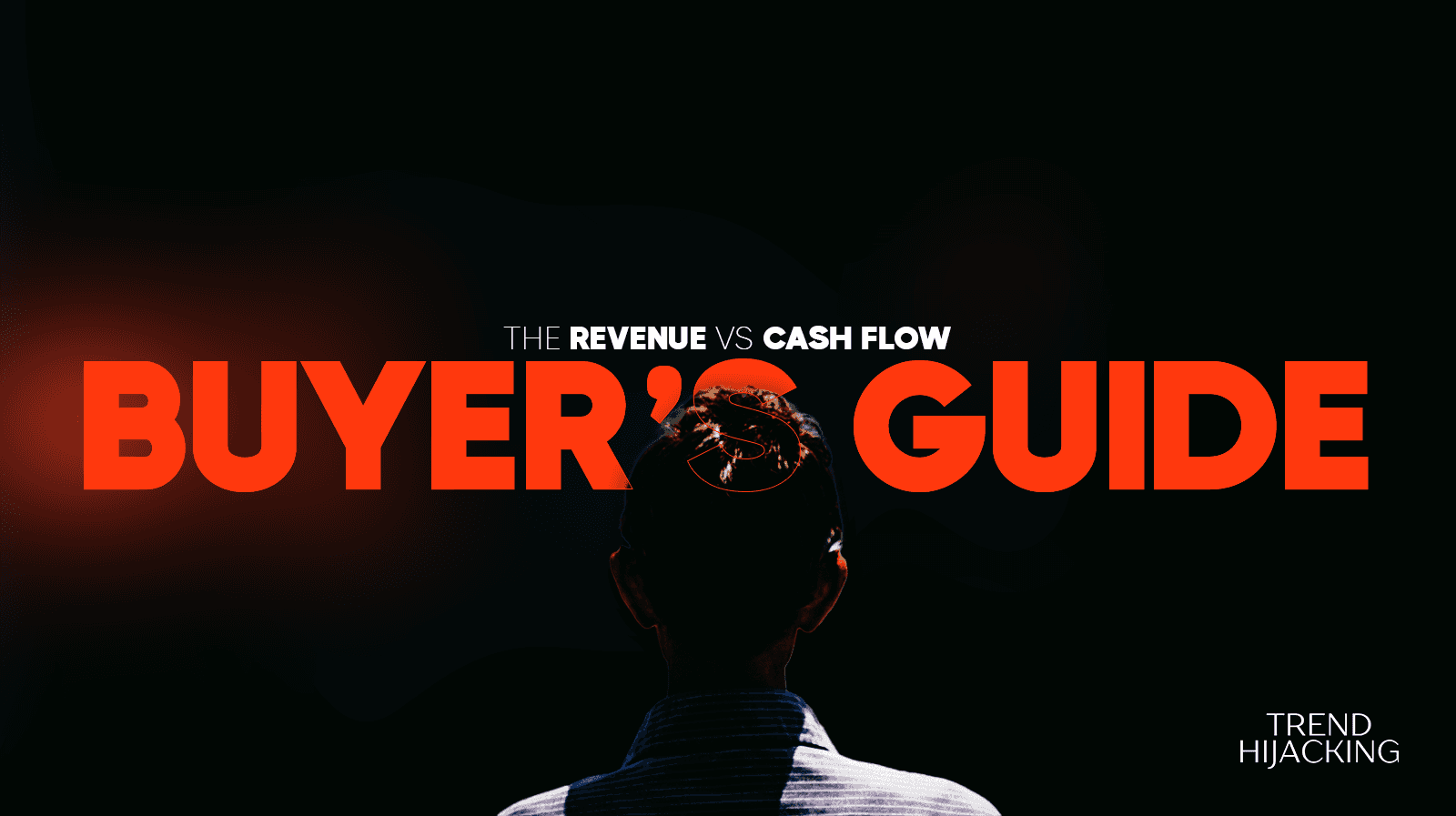
9-Point Checklist For Selling Your E-commerce Business Fast
When you finally decide that it’s time to sell your e-commerce business, you’ll quickly realize how daunting this process really is.
It often feels like a maze.
Buyers ask you never-ending questions. Brokers throw jargon at you.
And in the middle of it all, you keep worrying: “What if I price too low? What if the deal falls through?”
Many sellers end up losing money or wasting months trying to sell their businesses because they miss small but critical steps.
This checklist will help you stop that.
It walks you through exactly what matters when it comes to preparing, valuing, and handing over your business.
This way, you can sell with confidence and walk away knowing you didn’t leave money on the table.
1. Document the “Hidden” Knowledge

A lot of sellers underestimate how much of their business lives inside their heads.
Buyers know this pretty well, and it makes them nervous.
If they feel like the business only works because you’re the one running it, they’ll see risk and either walk away or push for a lower price.
(Check out this post on what buyers interpret as red flags when evaluating e-commerce businesses)
The fix here is simple: Pull that knowledge out of your head and put it into a form they can use.
Write playbooks that show exactly how you handle orders, returns, and marketing campaigns.
Record short screen-share videos walking through how you manage Shopify or your ad dashboards.
Even jot down the unwritten tricks—like when a supplier usually runs out of stock or how you negotiate a discount.
This kind of prep makes buyers feel like they can step in and run things without you.
Sell Your E-Commerce Business Fast
At TrendHijacking, we help you connect with serious investors who are ready to buy e-commerce businesses like yours.
We check all the numbers and present your business in the best light. Our pre-vetted buyers skip the “is this real?” stage, so you can get a better price and close faster.
Submit your business details today and make selling simpler, faster, and more profitable.
2. Clean Up Revenue Quality

Buyers won’t just look at how much money your store makes… they want to know how stable that money really is.
If most of your traffic comes from one ad channel, or if your store is seasonal-based (i.e., sales only spike during holidays), they’ll see a fragile business.
On the flip side, if you can show steady revenue from different traffic sources, plus a healthy number of repeat customers, your valuation goes up.
According to recent reports, organic search still drives over 40% of e-commerce traffic.
If you can prove you aren’t fully dependent on paid ads, buyers will feel much more confident about long-term growth.
Related: How To Value Your E-commerce Business Before Selling
3. Fix “Single Points of Failure”

One of the biggest things that kills deals quickly is RISK.
Consider this;
If your entire business relies on one supplier, one freelancer, or one ad account, buyers see a house of cards.
Before you sell, create backups.
Add a secondary supplier, open new marketing channels, and make sure someone else knows how to handle customer service if your go-to person disappears.
Even if you never use these backups yourself, it shows buyers that the business won’t collapse overnight.
4. Do More Than Show Numbers; Tell the Story

Yes, spreadsheets do matter. But, unfortunately, numbers alone won’t get buyers excited. They want to see the story behind the growth.
As such, you want to write a simple deck that explains how the business started, what roadblocks you’ve solved, and what opportunities are still on the table.
If you’ve proven the model and left room for more growth, that’s attractive.
Think of it like selling a house. The stats prove the value, but the story makes someone want to move in.
5. Decide Your Walk-Away Terms Early

Negotiations can wear sellers down fast, especially if they haven’t thought through their limits. Before you even start, you want to decide what matters to you.
Do you need all the cash upfront, or would you consider installments?
What’s the absolute lowest number you’ll accept and still feel good walking away?
How long are you willing to stay around after the sale? Just a week or a full three months?
Having these answers ready keeps you grounded when buyers push for terms that don’t work for you.
Sell Your E-Commerce Business Fast
At TrendHijacking, we help you connect with serious investors who are ready to buy e-commerce businesses like yours.
We check all the numbers and present your business in the best light. Our pre-vetted buyers skip the “is this real?” stage, so you can get a better price and close faster.
Submit your business details today and make selling simpler, faster, and more profitable.
6. Vet Buyers As Hard as They Vet You
A lot of sellers focus so much on impressing buyers that they forget to check them out, too. That’s risky!
Before you share sensitive details, ask for proof of funds. Find out if they’ve run an online business before or if they’re just fishing for information.
Watch out for time-wasters who keep asking questions but never commit.
Qualifying buyers for your online store saves you time and makes sure your data doesn’t land in the wrong hands.
Related: How To Sell Your Online Business in 9 Easy Steps
7. Prepare for Buyer’s Due Diligence “Surprises”

Even the well-prepared sellers get caught off guard by the questions buyers ask.
Serious buyers want to know more than just profit and traffic.
They’ll want to know your chargeback history, refund rates, and how much of your sales come from discounts.
They might even ask about reliance on influencers or seasonal campaigns that could disappear overnight.
If you have this data ready before they ask, you look organized and trustworthy.
And more importantly, it saves you from scrambling in the middle of the deal.
Related: Frequently Asked Questions By E-commerce Business Buyers
8. Plan the First 90 Days for the Buyer

When you hand over your business, don’t just give the keys and disappear.
The new owner’s first three months are critical, and if you make that transition smooth, you’ll have a much easier time closing the deal at your asking price.
Think about what they’ll face right away.
They’ll need introductions to the people who keep things running—suppliers, agencies, maybe a freelancer or two.
They’ll need access to every system you use, from ad accounts to inventory tools, without delays.
And they’ll need a heads-up about any tricky weeks ahead, like a holiday rush or a supplier’s annual break.
The more you prepare them for those early challenges, the more confident they’ll feel about buying your business.
9. Avoid the Most Common Mistakes

These are some of the most common mistakes sellers tend to repeat again and again:
Waiting too long to fix problems: Some sellers hope buyers won’t notice messy numbers or weak spots. They always do.
Inflating projections: If your future growth claims feel unrealistic, buyers will lose trust fast.
Rushing the process out of burnout: Selling too quickly often leads to poor deals and regret later.
Forgetting taxes: Your “sale price” and the money you actually keep after taxes can be very different.
Knowing these mistakes in advance and avoiding them will help you stand out from other sellers and make the selling process a lot smoother!
Related: How Long Does It Typically Take To Sell An Online Store?
Final Thoughts
Selling your e-commerce business should go beyond making a financial decision.
Think of it as handing over something you built and making sure you exit with no regrets.
If you prepare the hidden knowledge, clean up your revenue, remove points of failure, and plan a smooth transition, you won’t just get the sale done.
You’ll walk away knowing you sold on your terms and gave the new owner the confidence to take it further.
REMEMBER, selling an e-commerce business takes a lot of moving parts, but you don’t have to juggle them on your own.
Our team can handle every step for you, right from valuation to closing, so you get the best deal without the headaches or making mistakes that could stop your business from selling.
Just share your business details here, and we’ll get started right away.
A Done-For-You E-commerce Business
Discover how we Build, Launch, and Scale a 6-figure/month Business for You
Learn more
The 6-Step Blueprint to E-Commerce Acquisition
See how we Acquire, Convert, and Scale with Real Case Studies to Prove It.



















